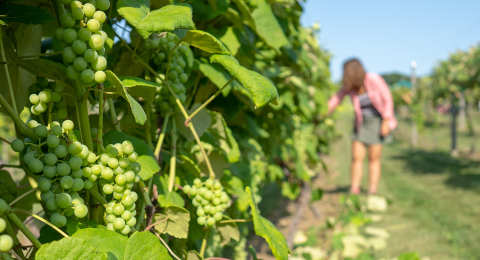If you are interested in sustainable food systems, nutrition, health and well-being, than the EcoGastronomy major at UNH is the program for you. This unique program blends sustainable food systems and culinary arts with business know-how. You'll get hands-on experience on local farms and in kitchens – and even spend a semester studying in Italy.
This dual major adds zest to any career path, but especially hospitality, nutrition, agribusiness, and food infrastructure. You'll be well-positioned for many jobs, from sommelier or chef to nutritionist or farm manager.
Students enrolled in the EcoGastronomy Dual Major may be eligible to receive a tuition discount equal to about $9000/year through the New England Tuition Break program. If you are from a New England state that does not have a sustainability undergraduate major (currently CT, MA, ME, RI, and VT), you will automatically qualify for this discount when you enroll in EcoG Dual Major.
What is EcoGastronomy?
The term “gastronomy,” defined as the “art and appreciation of preparing and eating good food” is paired with the prefix “eco,” indicating that the “art and appreciation” of food cannot be separated from our agriculture, environment, and the myriad social, economic, political, and ethical issues associated with food production and eating. This dual major requires completion of the EcoGastronomy program with any other major.
Why study EcoGastronomy at UNH?
The dual major in EcoGastronomy at UNH was the first of its kind at any university in the country. A partnership of the Paul College of Business and Economics and the College of Life Sciences and Agriculture, the program will provide you with a one-of-a-kind learning experience that links the fields of sustainable agriculture, regional cuisine, hospitality management, and nutrition. All students who declare the dual major in EcoGastronomy spend a semester abroad — in Ascoli Piceno, Italy; with a choice of spring, summer, or fall. Residents of Maine, Vermont, Rhode Island, Connecticut, or Massachusetts, under the New England Regional Program, receive a discounted out-of-state tuition.
Potential careers
- Chef
- Community health professional
- Dietary technician
- Farm manager
- Food and beverage manager
- Marketing & events manager
- Nutritionist
- Public policy analyst
- Sommelier
- Sustainability program director
- Teacher
Curriculum & Requirements
The Dual Major in EcoGastronomy integrates UNH strengths in sustainable agriculture, hospitality management, and nutrition. EcoGastronomy offers a unique academic program emphasizing the interdisciplinary, international, and experiential knowledge that connects all three fields.
The EcoGastronomy Dual Major is a collaboration with the University of New Hampshire's College of Life Sciences and Agriculture, Peter T. Paul College of Business and Economics, and the Sustainability Institute.
Degree Requirements
All Major, Option and Elective Requirements as indicated.
*Major GPA requirements as indicated.
EcoGastronomy Dual Major Requirements
| Code | Title | Credits |
|---|---|---|
| Required Courses | ||
| ECOG 401 | Introduction to Ecogastronomy | 4 |
| AGFS 405 | Sustainable Agriculture and Food Production | 4 |
| NUTR 400 | Nutrition in Health and Well Being | 4 |
| NUTR 403 | Culinary Arts Skills Development | 4 |
| or HMGT 405 | Introduction to Food and Service Management | |
| NUTR 686 | UNH-in-Italy Study Abroad 1 | 0 |
| ECOG 701 | EcoGastronomy Capstone 2 | 2-4 |
| Elective | ||
| Select one course from the following: | 4 | |
ANSC 602 | Animal Rights and Societal Issues | |
ANSC 698 | Cooperative for Real Education in Agricultural Management (CREAM) | |
AGFS 690 | Agricultural and Food Policy | |
HIST 618 | American Environmental History | |
HMGT 771 | International Wine and Beverage | |
HMGT 570 | International Food and Culture | |
MGT 662 | Exploration in Entrepreneurial Management | |
NR 602 | Natural Resources and Environmental Policy | |
NR 720 | International Environmental Politics and Policies for the 21st Century | |
NR 784 | Sustainable Living - Global Perspectives | |
NR 785 | Systems Thinking for Sustainable Solutions | |
NUTR 625 | From Farm to the Italian Table | |
NUTR 720 | Community Nutrition | |
NUTR 730 | From Seed to Sea: Examining Sustainable Food Systems | |
AGFS 620 | Food Systems & Community Resilience | |
AGFS 679 | Food Production Field Experience I | |
SOC 665 | Environmental Sociology | |
ZOOL 610 | Principles of Aquaculture | |
MEFB 772 | Fisheries Biology: Conservation and Management | |
| Total Credits | 22-24 | |
- 1
NUTR 686 UNH-in-Italy Study Abroad is a variable credit course. ECOG students must complete at least 8 credits of study abroad.
- 2
Satisfies the capstone requirement of the Discovery Program for the EcoGastronomy major.
Program Learning Outcomes
- Students will understand and be able to communicate the interconnected nature of the food system, taking into account the social, political, ethical, environmental, economic, and social justice issues that are intertwined in the system.
- Students will gain practical understanding of food system sustainability by engaging in experiential education opportunities.
- Students will be able to speak fluently in the language of sustainable food systems.
- Students will effectively analyze and evaluate the full lifecycle of a food, or food product, by identifying and applying reliable information.
- Students will demonstrate effective oral communication skills.
- Students will demonstrate effective written communication skills.
- Students will demonstrate effective presentation skills.
Explore Program Details
What is a dual major?
A dual major must be paired with a primary major, it cannot be taken on its own. It is a larger commitment than a minor, but not as much work as a second major. Some advantages of a dual major are specialization of two areas that can directly complement each other, multiple skill sets, more career options, exploration of areas beyond your career-related major and a larger social and academic circle.
Who can participate?
- All 4-year students can combine their primary major with the EcoGastronomy Dual Major.
- Students must have a declared primary major.
- Students need a GPA of 2.5 or above.
What is the New England Tuition Break Program?
Students enrolled in the EcoGastronomy Dual Major may be eligible to receive a tuition discount equal to about $9000/year through the New England Tuition Break program. If you are from a New England state that does not have a sustainability undergraduate major (currently CT, MA, ME, RI, and VT), you will automatically qualify for this discount when you enroll in EcoG Dual Major.
How do I declare the Dual Major in EcoGastronomy?
Before you declare you must have a 2.5 GPA or better and have a primary major declared.
- Go to my.unh.edu and login.
- Select Webcat
- Select Student Records
- Select Change of Major
- Select Change Major/Option
- Click on the link listed next to Second Major/Option
- Select a College(COLSA) from the dropdown menu
- Select the Dual Major from the dropdown menu
- Click Submit the selected major/option
- Select Confirm Request
What kind of professional opportunities are available for graduates?
We expect that Dual Majors in EcoGastronomy will find a wide array of applications in their careers. While the primary major will provide the foundation of the graduates' expertise and potential career paths, the Dual Major will complement this foundation by adding a more complex dimension to their primary focus. There are tremendous opportunities with non-profit organizations and government agencies, as well as food processing, marketing, organic certification and product development. This major provides students with many hands-on experiences, giving them an edge in the job market.
Do other universities offer EcoGastronomy programs?
No. A few offer somewhat similar programs, but they are generally tied to a specific degree program. EcoGastronomy is truly interdisciplinary, allowing for full, uninhibited, exploration of our vast food-system.










